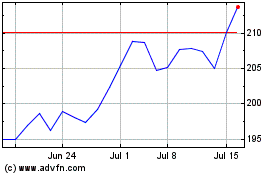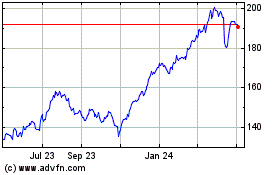By Ben Eisen and Akane Otani
U.S. companies are buying back their shares at a record pace,
providing fresh support during a rocky stretch for the stock market
when many investors have rushed for the exits.
S&P 500 companies that have reported earnings for the first
three months of 2018 have bought $158 billion of their own stock in
the first quarter, according to S&P Dow Jones Indices. About
85% of S&P 500 components have reported so far.
That is on pace for the biggest amount in any quarter, based on
data going back to 1998. It has been fueled in part by a new tax
law that is freeing up cash and encouraging companies to bring back
money held abroad.
Cash-rich companies are also increasing dividends swiftly.
S&P 500 firms are on pace to have returned almost $1 trillion
to shareholders for the 12 months through March though dividends
and buybacks.
"The reason these companies are buying their stock is that
they're smart enough to know that it's better for them than
anything else," said Charlie Munger, vice chairman of Berkshire
Hathaway Inc., at the company's annual meeting last weekend.
Early signs suggest share repurchases have been effective, even
in a year in which stocks have been tested by uncertainty around
global trade, the path of interest rates and regulation around the
technology industry. Of the 20 S&P 500 companies that spent the
most on buybacks over the first quarter, nearly three-quarters have
outperformed the index so far this year. The group has risen an
average of 5.2% in 2018, compared with the S&P 500's 1.9% gain,
according to a Wall Street Journal analysis of S&P Dow Jones
Indices data.
Apple Inc., the largest U.S. company by market value, said last
week that it would embark on a $100 billion buyback program. The
stock surged 4.4% the following day and 13% for the full week --
marking its biggest one-week percentage gain since October
2011.
Microsoft Corp.'s stock has risen 14% so far this year, after
the company bought back $3.8 billion in shares during the first
quarter. Boeing Co., JPMorgan Chase & Co. and UnitedHealth
Group Inc. are up this year after big first-quarter buybacks.
Share repurchases can play a key role in supporting stock prices
because they lower companies' shares outstanding counts -- driving
up per-share earnings even without overall profit growth. Many see
them as a reward for shareholders, particularly when other
corporate options for spending cash, such as acquisitions, don't
look attractive.
Executives say buybacks show management is bullish on the
company's prospects and believe its shares are a good value.
Rising buybacks this year have been a crucial counterbalance to
the rising tide of stock-fund redemptions. Investors yanked $29.4
billion out of exchange-traded funds and mutual funds tracking U.S.
stocks in the first quarter, the most for any three-month stretch
since 2016, according to a Bank of America Merrill Lynch report
citing EPFR Global data.
The S&P 500 is up only modestly for the year. Yet many
analysts believe major indexes would have suffered losses without
the support of buybacks.
Corporations have long been among the biggest buyers of stocks
-- making their share repurchases a major contributor to the
nine-year bull market. Companies seized the chance to scoop up
discounted shares following the financial crisis, with buybacks
topping out in 2015 at $572 billion before leveling off.
Now with new tax incentives, share repurchases are ramping up
again. The tax code overhaul President Donald Trump signed into law
late last year assessed a one-time tax on foreign earnings, meant
to encourage companies to repatriate more than $2 trillion in cash
held overseas.
While that cash can be used for any number of activities, early
signs suggest that much of it is going into shareholder returns.
Goldman Sachs Group Inc. expects S&P 500 companies' spending on
buybacks and dividends to increase by 22% to $1.2 trillion in 2018,
outpacing the expected increase in capital expenditures and
research and development in 2018, which it sees jumping 11% to $1
trillion.
"Activity is very widespread and we're seeing it executed in a
lot of ways," said Jake Mendelsohn, a managing director at Bank of
America Merrill Lynch who leads the desk that does corporate
buybacks.
Share repurchasing has its critics. Mr. Munger noted that buying
shares just to keep the stock up is "insane and immoral." Some
detractors say spending on buybacks can come at the expense of
spending on R&D or equipment upgrades -- things they believe
are the ultimate drivers of growth over the long run.
"For so long, productivity growth has been anemic or worse, and
the plan has just been to pay your shareholders," said James Camp,
managing director of fixed income at Eagle Asset Management.
But as the trend continues, market giants aren't the only ones
that have benefited from buybacks. Kennedy-Wilson Holdings Inc., a
real-estate investment company based in Beverly Hills, Calif.,
announced in mid-March that it would repurchase shares totaling
$250 million, about a 10th of its market value, over the next 18
months. Within five weeks, it had already blown through half of
that total with a combination of private transactions and a program
where its bankers buy shares on their behalf when they drop below a
certain level.
The buyback program, the company's biggest ever in its
decade-plus stretch as a public company, appears to be working.
Though the stock had been volatile along with the broader market
earlier in the year, it started rising pretty much as soon as the
program began. So far this year, shares are up 14%.
"The stock has been performing pretty well the last couple
months relative to the rest of the market," said Matt Windisch, who
oversees the company's buyback program. "Certainly the buyback
played a role in that."
The buyback strategy is not infallible. Amgen Inc., the second
largest buyer of its shares among reporting companies in the first
quarter, repurchased $10.6 billion of shares in the first three
months of the year. Its shares are down 1.8% this year.
That hasn't stopped companies from continuing to pump cash into
buybacks. Amgen expects to buy back between $2 and $4 billion more
of its stock in the second quarter, the pharmaceutical giant
said.
Write to Ben Eisen at ben.eisen@wsj.com and Akane Otani at
akane.otani@wsj.com
(END) Dow Jones Newswires
May 10, 2018 17:06 ET (21:06 GMT)
Copyright (c) 2018 Dow Jones & Company, Inc.
JP Morgan Chase (NYSE:JPM)
Historical Stock Chart
From Mar 2024 to Apr 2024

JP Morgan Chase (NYSE:JPM)
Historical Stock Chart
From Apr 2023 to Apr 2024
